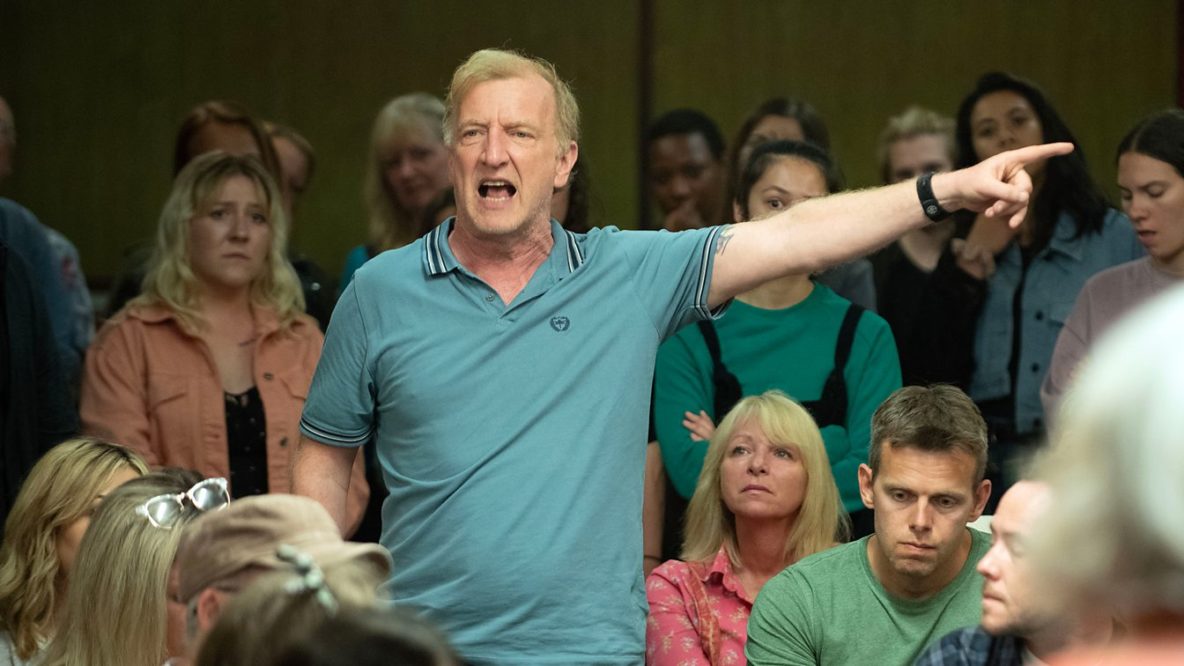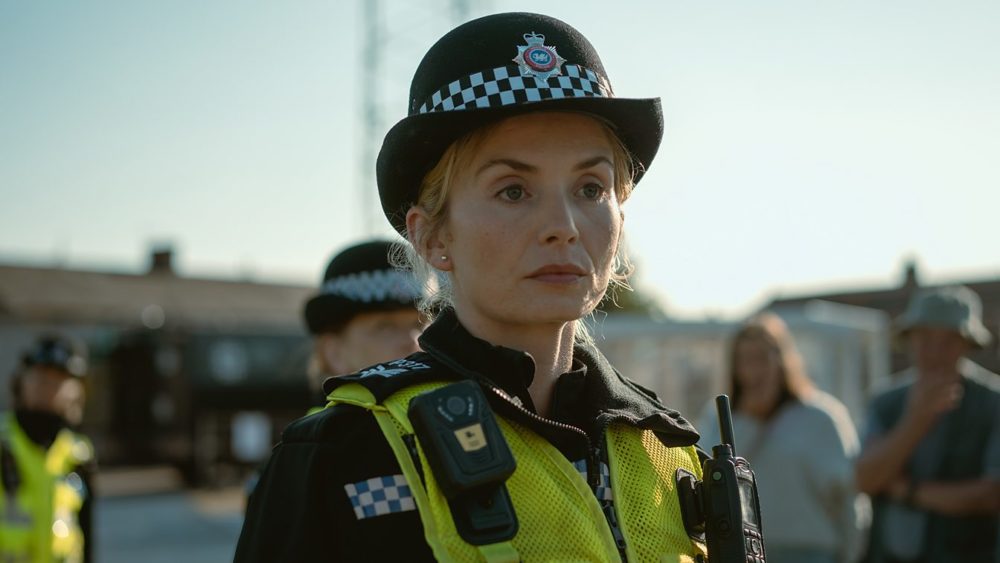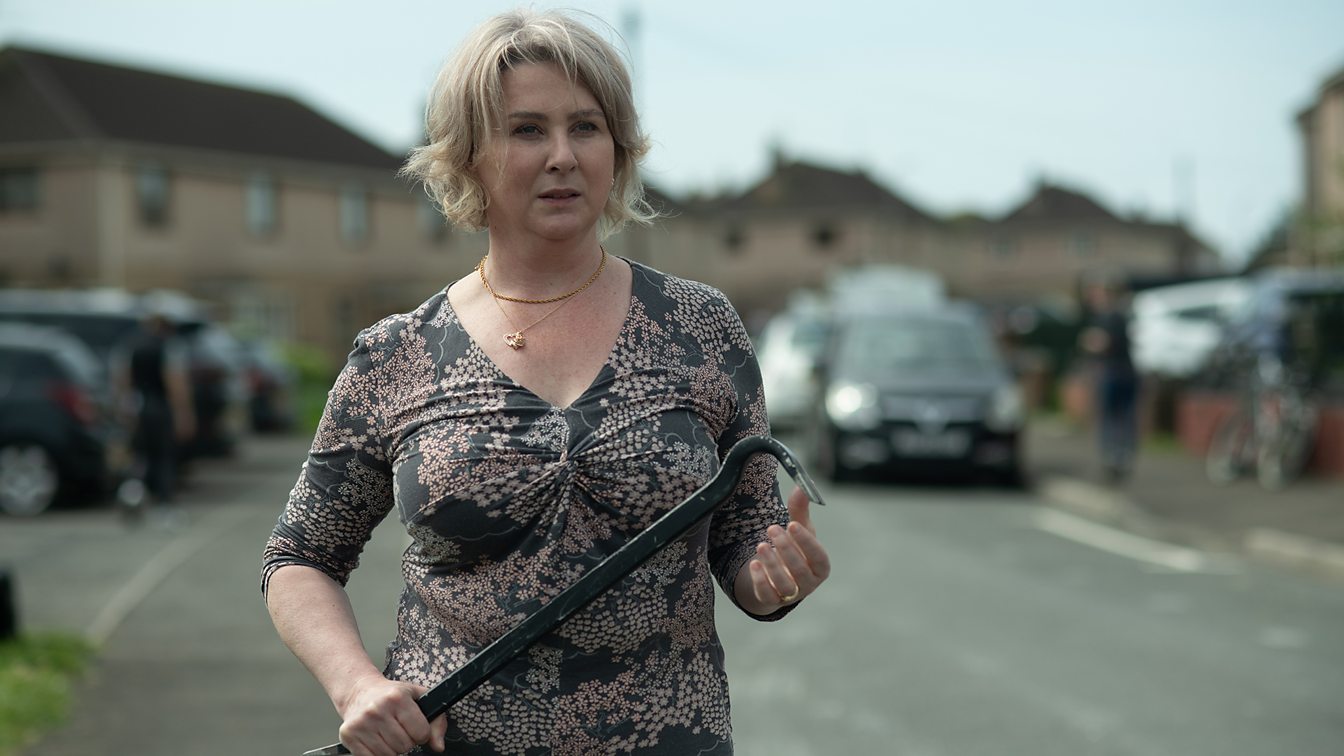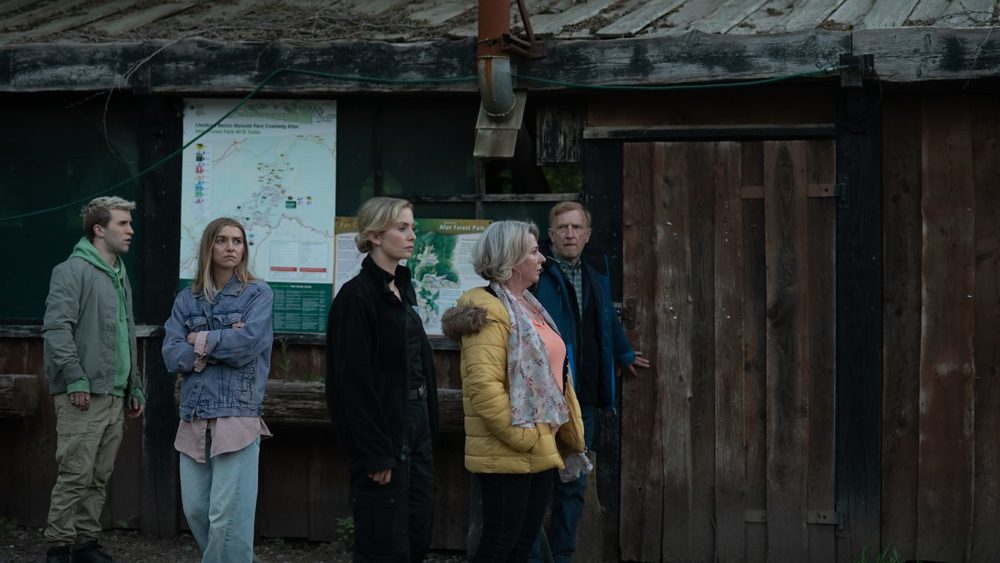Review: The Way – BBC television series

Sarah Tanburn
‘In a choice between all or nothing, is the answer then nothing?’ hisses Michael Sheen in his son’s ear.
It is the defining question of The Way. Aired last week and all three episodes available on iPlayer, the series should be compulsory viewing for anyone interested in Welsh choices, opportunities and culture.
If it seems eerily prescient of the current Tata catastrophe, that is because these problems of deindustrialisation and globalisation, of inequity and greening our economy are real and urgent – and not only in Wales.
Compromise and fury
Geoff Driscoll (Steffan Rhodri) is haunted by this father who killed himself after a blockade against imported coal failed.
Geoff, a shop steward at the Port Talbot steelworks, is trying compromise and consensus to protect jobs and the town into the future – to the anger of the steward working with him. Geoff’s estranged wife, Dee (Mali Harries) has retained the firebrand politics of their youth.
Their children are equally divided. Owen (Callum Scott Howells) is drifting through life, sedated to compliance by prescribed benzodiazepine in a desultory relationship with eastern European waitress Anna (Maja Laskowska).
Thea (Sophie Melville) is a policewoman and mother of four-year-old Rhys. Dan, her husband, is working in Germany, from where he watches the media story unfold in horror.

Anger grows when a young man falls into a vat of molten steel. His father, who saw it happen, sets himself alight on the main street in protest.
The East Asian owners are looking to shut down a furnace; when they turn off the pilot light that flares from one of the town’s chimneys, both fear and fury ignite among the residents.
Their protests and strikes are met with maximum force. Confrontations spread and escalate fast; emergency powers of detention are invoked and all movement in or out of Wales prohibited.
When Owen snaps out of quiescence and throws the first weapon across the police line, the family find themselves a target for the authorities and a symbol of revolutionary violence. They go on the run, led by Thea who is desperate to reunite with Dan.
Immersion in yesterday and tomorrow
Director Michael Sheen (who needs no introduction here) also plays the ghost. He worked on this production with documentary-maker Adam Curtis (Russia 1985-1999: Trauma Zone) and writer James Graham (Dear England).
The team has made extensive use of archive footage, particularly of the 1980’s miners’ strike, together with material from other moments of unrest and uprising.
Memory is intense and immersive, old scars torn open not only in family intimacy but in the streets and meeting rooms of an angry community.
Forty years of Welsh industrial history flicker on the screen, as immediate as anything on the news bulletins, making the unfolding drama seem close, possible, maybe even necessary.
Maybe, when nothing is the choice, we must put our all on the line.

The opening episode is as fine a piece of television as I’ve seen in a long time, an imaginative tapestry of script and camerawork which is both richly allusive and tautly economical.
The first shot inside the works is reminiscent of Williams’ 1825 watercolour Cyfarthfa Ironworks Interior at Night (featured on another excellent BBC series, The Story of Welsh Art presented by Huw Stephens, which deserves also to be streamed.)
Older figures haunt the area: Green Man descendant, Simon the Prophet (Jonathan Nefydd) flickers in and out of the story, perhaps to return.
The series is steeped in the specificities of south Wales, in local stories, in tribal anger and quirks of language.
Yet the despairing rage of a town betrayed by corner-cutting and corporate profit above local wellbeing is to be found everywhere and in some places is already boiling over.
What about another helping?
There needs to be another series, and maybe Sheen has set it up that way. Deepfake news is essential to the plot but its use to dictate the Hogwood’s actions seems glib.
If you go to the lengths of dressing up the character (Luke Evans) as cross between the Witchfinder General and the Man With No Name, he deserves more of a driver than the algorithms of an overstretched and desperate intelligence service. I’d would like to see more both on the man and the technology.
There are moments when the family’s luck seems unlikely. (Beware minor spoilers in this paragraph.)
Would Dee’s sister’s neighbours really have kept quiet about what they saw? Afan Forest Centre seems too obvious a staging post for the authorities to miss. Grandpa’s use of his card alongside Rhys’s quiet ‘diolch’ seems overkill after the economy of other scenes.
These are quibbles, all the same when we all want to know what happens next.
Faced with armed police and Dan begging for their lives, what becomes of Thea and Rhys? Have the authorities, meeting desperate people with overwhelming force, put themselves into an authoritarian corner with no escape?
Most of all, what can Owen and Anna achieve together?

Moral certitude
Sheen asks: what is the right thing to do? What is the way forward now? Of course, those questions confront our leaders, our representatives, our employers and customers and teachers.
The series insists that every one of us has a role in deciding what is right and how we might live. The ballot box is not working too well right now, but it is still better than no ballot at all. It is only a necessary part of democracy, but insufficient for self-determination.
Perhaps most of all, this story points to the paradox of moral certitude. Without it, in trying to find the pragmatic consensus, the rational solution, we may achieve nothing.
Virtue quickly becomes vacillation. Yet the moral certitude of protest – whether from strikers or antifa, climate warriors or the BNP – is not an answer either.
At best, it is catharsis.
‘Save our steel’ does not put food into hungry bellies or stop the blood flowing from the truncheon blow. Fury may feel like the ‘all’, but it too offers a false promise.
To return the question with which we began, how to find a way to a different future, we need another series. So, get on with it please, the powers at the BBC and Mr Sheen.
We all need help with this problem, and the sooner the better.
All three episodes of the first series of The Way are available on iPlayer or online
Support our Nation today
For the price of a cup of coffee a month you can help us create an independent, not-for-profit, national news service for the people of Wales, by the people of Wales.








You need a series like this to wake you up from one’s apathy .Michael Sheen is to be commended . Thanks ,Ben
Stunning directorial debut from Michael Sheen! Stuffed with historical and literary references [including Pais Dinogad – the oldest known lullaby in a Brythonic tongue] and clever rôle-reversals with UK citizens becoming refugees [“It happens everyday – all over the world” Anna reminds the Driscolls] culminating in them having to take a Small Boat from Dover to Calais. Excellent stuff! The only weakness really was the final scene, struggling for a resolution, when they – and we – know that there can be none, given the current imbalance of power between corporations and, even unionised, individuals.
Let’s hope that our people in Wales realise the dangers that loom by staying within a state that has a colonial mindset. The DORA act and repressive measures always remain close to the surface if they perceive a threat to the status quo!
The essential differences in our nations has to be realised so that our people respect our history and culture in a positive way.
Great job Michael Sheen, keep up the good work!
A Morality play for the 21st century. Excellent, p****d the Telegraph off!
Would just like to say without detracting from the rest of the cast, that despite a relatively small role, Jonathan Nefydd deserves be seen by a wider audience than S4C’s.